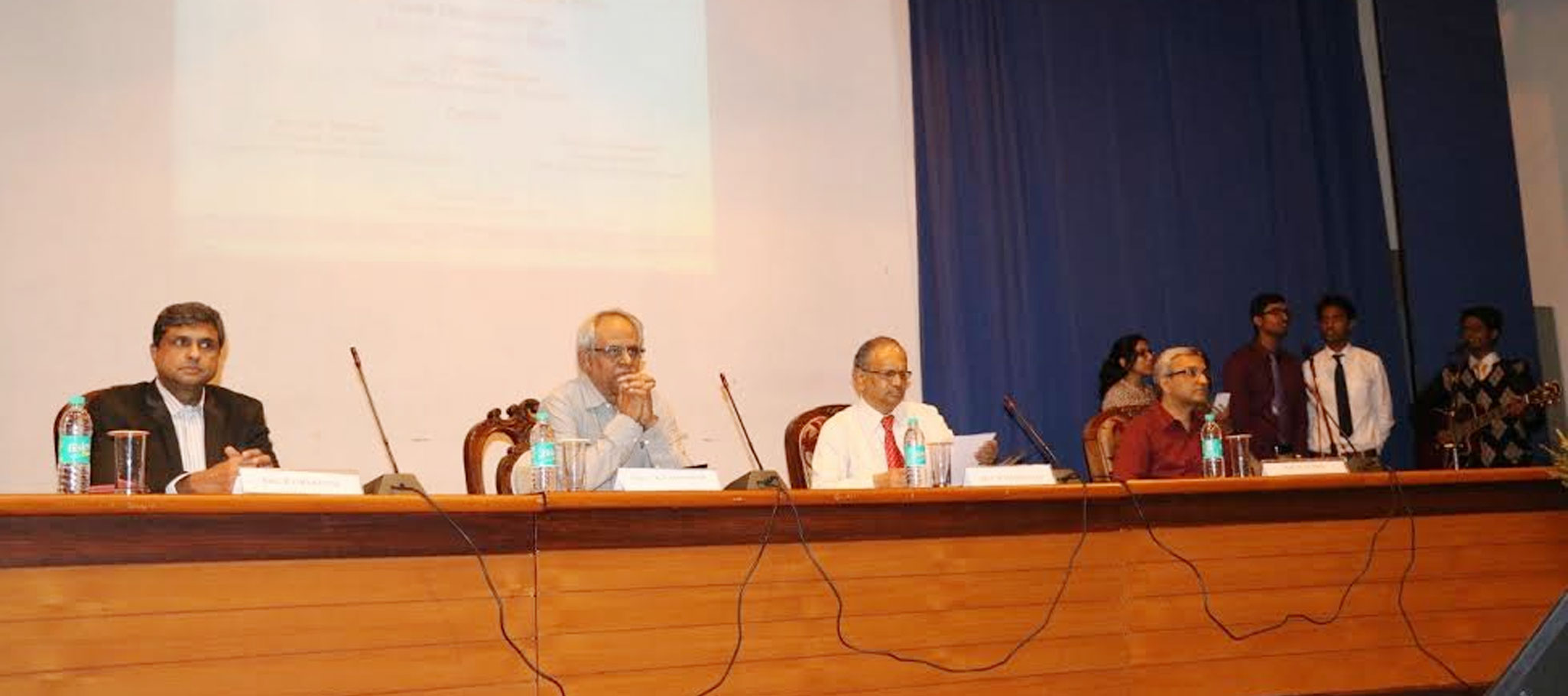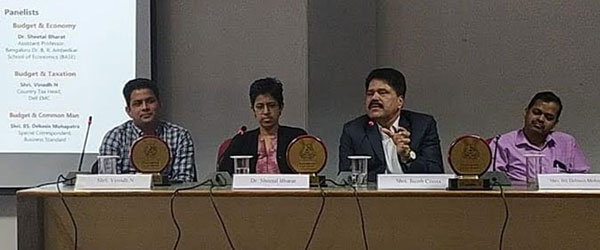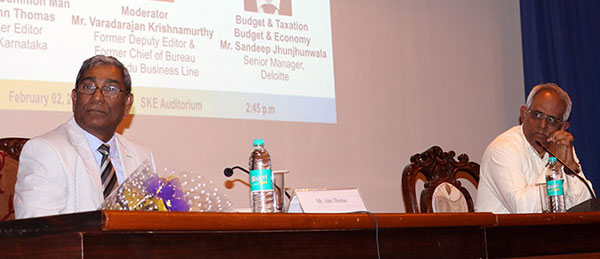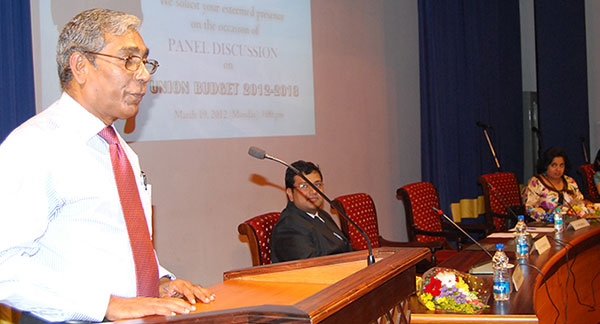
Panel Discussion
To kindle the young minds on recent and burning issues, Kristu Jayanti Institute of Management organizes Panel Discussions were in Industry Professionals are invited to discuss and bring in various perspectives and insights on campus. The following panel discussions were conducted this year for both the first and second year MBA students
Virtual panel discussion on Union Budget 2022-23
Kristu Jayanti Institute of Management organised a virtual panel discussion on Union Budget 2022-23 on 2nd February 2022 at 3.00 p.m. through the Zoom Cloud Meeting platform. Shri. K R Sekar, President, Bangalore Chamber of Industry and Commerce (BCIC) & Partner, Deloitte was the moderator, Mr. Arun Ramachandran, Director Tax, Tata Consumer Products Ltd, Dr. Gayithri K, Professor, Centre for Economic Studies & Policy, Institute for Social and Economic Change and Shri. Shine Jacob, Senior Asst. Editor, Business standard were the esteemed panelists.
The session started with a formal introduction and welcome to the expert panel members. Shri. K R Sekar gave a prelude to the session and spoke about the top policy announcements and major highlights of Union Budget 2022-23, he gave a few opening remarks for the discussion. He named this budget as a strategic budget, a futuristic budget that will herald the growth for Indians in the next few years.
The first panelist of the discussion was Dr. Gayithri, she spoke on the topic, ‘Budget – Public Spending and Beyond’ focusing on the implications and philosophy in Budget 2022-23. She made students understand the implications and spending proposals on economic under the current circumstances; named the computation of the Global Stringency Index to measure the stringency of Covid on a global scale, and India was the highest with 85.6 level.
Mr. Arun Ramachandran gave his insights on the topic, ‘Budget and Taxation’. He explained about budget and the reason for including tax amendments in the budget and finance bill. He also spoke on crypto tax and tax on digital assets primarily about the trading and transactions in cryptocurrency and TDS, also briefed about the importance of trading in startup companies.
The third panelist Shri Shine Jacob shared his thoughts on ‘Budget and the Common Man’. He cited that the expectations of the common man on tax relief were not met instead the budget outlines measures to ationalize the tax structure and bring out changes in the tax processes.
This panel discussion was very informative for both students and all participants and it ended with a question and answer session and a formal vote of thanks and the College Anthem.
The Institute of Management organized a panel discussion on the Union budget on 03rd February 2020 to deliberate and discuss the implications of the budget on industry, economy and the common man. This was preceded a day earlier on 01st February 2020 by a live telecast of the Union Budget presented in parliament by the Honorable finance minster Smt. Nirmala Seetharaman. The panelists included a diverse set of representatives from Academics, Media and Industry. The esteemed panelists included Dr Sheetal Bharat, Assistant Professor, Bengaluru, Dr B.R Ambedkar School of Economics (BASE), Sri Vinodh N, Country Tax Head, Dell EMC, Sri Darlington Hector, Executive Editor, Financial Express. The discussion was moderated by Sri Jacob Crasta, Chairman, CM Environsystems Pvt Ltd and LSquare Eco-Products Pvt Ltd. The Panel discussion was flagged of Dr Aloysius Edward, Dean, Faculty of Commerce and Management, Dr M.K Baby, Head, Institute of Management. The discussion was organized by Prof. John Pradeep Kumar, Faculty, Institute of Management. The Panel discussion was attended by the I and II year MBA students. The panelists received a rich volley of questions by the students during the interactive session questioning the highs and lows of the budget.

Kristu Jayanti Institute of Management, organized a panel discussion on Union budget 2018-19 on February 02, 2018. Mr. Varadarajan Krishnamurthy Former Deputy Editor & Former Chief of Bureau, The Hindu Business Line was the moderator. Mr. John Thomas, Former Editor, Vijay Karnataka and Mr. Sandeep Jhunjhunwala, Senior Manager, Deloitte were the panellists.
The programme started with the first year MBA students presenting on various aspects of the Union Budget 2018-19 like, The Railways, Common man and Corporates based on their observation & analysis during their live session on the budget at the college auditorium. The panel discussion commenced after the student presentations. Mr. Varadarajan Krishnamurthy gave a brief prelude to the panel discussion. Mr. John Thomas addressed on ‘Budget & Common Man”. Mr. Sandeep Jhunjhunwala deliberated on “Budget & Taxation” and “Budget & Economy”. The discussion threw light on various aspects of the budget, expectations, miss outs, areas neglected, areas focused etc. The session ended with a Q & A interaction.

The program started at 2.00 pm in SKE auditorium. Dr. B.L Bhagyalakshmi, Former Director, Dept. of college of education, Govt of Karnataka has acted as Moderator of the Panel discussion on UNION BUDGET 2016-17. She has stated some of significant budgets from the Independence of our country. She has pointed out some of economic reformations and developments from the earlier budgets. Then she invited the first panelist to discuss the budget and taxation.
Mr. Parameshwaran E.R, Associate in BMR has displayed some of highlights in the union budget 2016-17 through powerpoint presentation. He stated tax benefits to government and startup business. He also pointed out service tax increases (0.5%) on pubic service access and income tax increases on creamy layers and corporate. He stated the luxurious taxes and some direct & indirect taxes towards the public.
Then moderator invited the second panelist Prof. Devandra Babu from Institute of social & economy change (ISEC). He started his discussion on Budget & Economy. He pointed out some economics theories on budget preparation and how the current budget contributes the economic growth. He listed the GDP, percapita income, inflation rate and our RBIs’ contribution to maintain the currency value.
Then moderator invited the third panelist Mr.John Thamos, Consultant editor, International Business Times. He started is discussion on Budget and common man. He stated some live examples of demand, supply and price of necessity goods and services. He pointed out how common man affects the current budget 2016-17. Which are the goods may get price increases and price reduction goods? How common man directly and indirectly affected from this budget? He explained the budget and common man detailed manner.
Finally moderator concluded the budget highlights and panel members viewpoints through her observations. She asked students forum for questions. Some students raised few questions and answered by panel members and Moderator madam Dr. B.L Bhagyalakshmi.
At 4.45pm panel discussion on union budget 2016-17 program got over.

Make in India is an initiative program of the government of India launched by Prime Minister Narendra Modi on 25th September 2014 to encourage companies to manufacture their products in India. The Prime Minister took a lion's step to make India into a global manufacturing hub and increase the employment rate as well as the growth in the country's GDP by launching the Make in India campaign.
The department of management studies of Kristu Jayanti Institute of Management had organized a Panel Discussion on the subject matter, emphasizing on reinventing skills for the students of MBA & PGDM on 1st August which was attended by representatives from various colleges. The panel consisted of distinguished personalities from different spectrums Shri. Varadarajan Krishnamurthy( Former Chief of Bureau & Deputy Editor, The Hindu-Business Line), Shri. Raj Raj Kumar( Director & Site Leader, TE connectivity), Shri. Raj Raghavan( Director & Country HR leader, Amazon), Shri. Jason Samuel( VP- HR, TVS Motor Co Ltd) and Shri. Winston DeRosario( Director, Grant Thornton).The Panel in general reinforced the fact that Indian economy possessed greater potential to become world leaders than any other economy in the world. The panel focused on the key areas of Make in India Campaign - Defence, Infrastructure, Energy and Consumer service. The campaign does not restrain itself only towards manufacturing sector but also highlights on building a strong E-Commerce in India to transform the way India buys and sells. The growth of Indian Economy has been commendable since Independence and with the youth of the country on their toes with a greater mission of Make in India, India is sure to reach its 3rd trillion in less than 5 years.
Finally the students were told on individual contribution by removing people prejudice, seeking empowerment and not employability and by embracing change. The panel in one accord urged the students who are the future of India not just to Make in India but to work for a greater cause to MAKE INDIA.